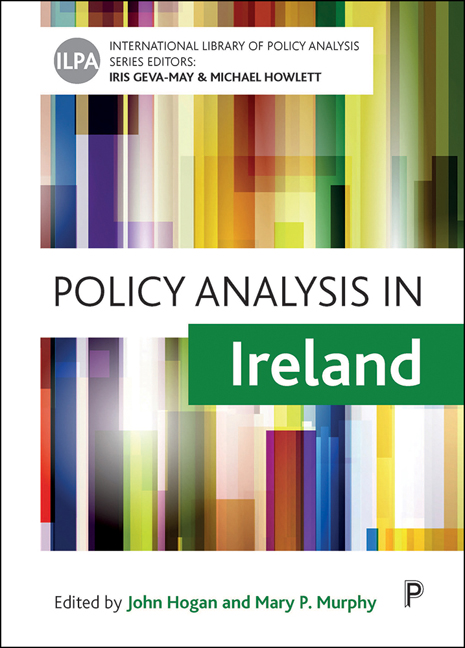Book contents
- Frontmatter
- Contents
- List of figures, tables and boxes
- List of abbreviations
- Notes on contributors
- Editors’ introduction to the series
- Acknowledgements
- Foreword
- Preface
- one Contextualising policy analysis in Ireland
- Part One: History, styles and methods of policy analysis in Ireland
- Part Two: Policy analysis at various levels of government: from local to the EU
- Part Three: Think tanks, interest groups, political parties and gender-based policy analysis
- Part Four: The public, science and the media: the wider policy analysis environment in Ireland
- Index
five - Introducing evidence into policy making in Ireland
Published online by Cambridge University Press: 18 December 2021
- Frontmatter
- Contents
- List of figures, tables and boxes
- List of abbreviations
- Notes on contributors
- Editors’ introduction to the series
- Acknowledgements
- Foreword
- Preface
- one Contextualising policy analysis in Ireland
- Part One: History, styles and methods of policy analysis in Ireland
- Part Two: Policy analysis at various levels of government: from local to the EU
- Part Three: Think tanks, interest groups, political parties and gender-based policy analysis
- Part Four: The public, science and the media: the wider policy analysis environment in Ireland
- Index
Summary
Introduction
In recent decades, Ireland has followed the trend (increasingly prevalent in the United Kingdom [UK] and the European Union [EU] from the mid-1990s) towards increased use of empirical evidence in policy making. The evidenceinformed (rather than evidence-based) approach favoured in Ireland recognises that other less easily measurable factors also come into play in policy formulation. The evidence sources and methods adopted are wide-ranging, reflecting the increased access to anonymised micro-data from survey and administrative data, the greater volume of research studies based on econometric, experimental and quasi-experimental approaches, and on qualitative approaches used particularly by sociologists and psychologists. This chapter focuses on the broad approach being adopted in Ireland, with a specific emphasis on the major developments in data quantity, quality and access to official statistics, under the auspices of the Central Statistics Office (CSO), and on the Irish Government Economic and Evaluation Service (IGEES), established to build the skills sets needed to analyse data from these new sources. The chapter ends with a short discussion of the new challenges and opportunities ahead.
The next section discusses the adoption of a more evidence-informed approach in Ireland. This is followed by a detailed look at an important part of the development of the evidence base for policy in Ireland, namely, the evolution of the Irish Statistical System under the leadership of the CSO and the National Statistics Board (NSB). The chapter continues by exploring how progress is being made in equipping the system with the skills needed to analyse the newly available data through the establishment of the IGEES. The final section looks at some new challenges and opportunities ahead.
The adoption of an ‘evidence approach’ to public policy
While the concept of using evidence to inform public policy has been around for several hundred years, the explicit issue of the evidence approach, and the associated set of methodologies used for decision making in public policy, have come strongly to the fore since the mid-1990s (Pawson, 2006; Lunn and Ruane, 2013). At the centre of this focus is a more systematic approach to the use of evidence, with the understanding that better policy decisions and societal outcomes could be achieved by policy makers drawing on objective and comprehensive evidence provided by researchers and analysts, and by policy makers actively seeking and commissioning relevant objective evidence to inform their decisions (see Nutley et al, 2010).
- Type
- Chapter
- Information
- Policy Analysis in Ireland , pp. 63 - 76Publisher: Bristol University PressPrint publication year: 2021

